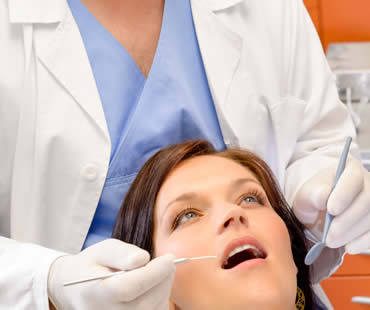
Are you or someone in your family missing a single tooth due to an accident, infection, or fracture? If you are missing a single tooth for any reason, a single tooth dental implant can replace both the natural tooth and its root. The best, long-term option for restoring a single missing tooth is a dental implant fitted with a crown.
To place the implant, a small titanium post is inserted into the jawbone. This anchor provides a “root” for the placement of the implant that looks, feels, and functions like a natural tooth. These “anchors” are extremely compatible with bone and attach to the jawbone and gums to become a base for the crown. A temporary tooth can be placed while the dental implant integrates with your natural bone to form a foundation for a crown. Once the implant has fused to the bone, the final step in the treatment is the placement of the permanent crown onto the dental implant.
One of the advantages of a dental implant is that it allows you to replace a single tooth without sacrificing the health of neighboring teeth. Other treatments, such as bridges, require the adjacent teeth to be ground down to support the appliance. Grinding down the teeth damages tooth enamel and structure. Also, a single implant can be more aesthetically pleasing and easier to keep clean than a bridge.
It is of vital importance to replace even one missing tooth, as leaving it untreated can cause bone loss, compromised chewing ability, as well as an unattractive smile. If you have one missing tooth, or a tooth that needs to be removed due to damage or decay, the best and most natural option is a single tooth dental implant.
Contact one of our dental offices Kogarah and Haymarket

The school year has started and kids are busy with school, sports, and social activities. It’s a challenge sometimes to get your kids to eat healthy when they are on-the-go, not only for their overall health but also for their oral health. Here are some tasty and healthy snacks that you can offer your kids, and chances are they’ll like them!
Yogurt
Dairy foods help build strong bones, and they’re also great for a strong mouth. Eating low-fat yogurt provides calcium. Try mixing it with berries and granola for a healthy parfait, or making homemade fruity yogurt popsicles to attract your children’s attention.
Cheese
Besides providing calcium, cheese helps fight cavities. It triggers saliva production, which washes away food particles in your mouth and the acids that can weaken your teeth. In these ways, cheese halts the process of cavity formation. Cheese not only contains calcium but also phosphorous, which both help rebuild the enamel on your teeth.
Blueberries
These berries may be small, but they’re packed with Vitamin C, minerals, and folic acid. They also contain ingredients which studies show help prevent diabetes and cancer. Try adding blueberries to pancakes and muffins, or sprinkling them with a small amount of sugar and topping them with whipped cream.
Almonds
Nuts like almonds contain ingredients to fight diseases, as well as Vitamin E, fiber, calcium, and iron. Most kids enjoy eating almonds raw, but remember they are a choking hazard for young children.
Whole wheat bread
Bread made with whole wheat provides kids with iron, zinc, magnesium, and vitamins. Whole grain cereal offers calcium, fiber, and vitamins. Enjoying these whole wheat snacks with milk provides an even healthier snack for your kids.
Contact one of our dental offices Kogarah and Haymarket

Beautiful smiles with sparkling, straight teeth are common sights these days. Many people seek various treatments to help improve the appearance of their smile, and one of the popular choices is dental veneers. Read more to find out about this quick and painless way to transform your look, and obtain a smile that others envy.
Description
A very thin porcelain shell is permanently attached to the fronts of your teeth with a durable dental adhesive. Veneers are stain resistant and can be as white as you choose. These natural-looking restorations can hide chipped teeth, gaps, misaligned teeth, and discolorations.
Procedure
A small amount of your tooth enamel is removed to allow your dentist to properly place your veneers. A model of your teeth is created to be used to create perfect veneers customized to your mouth. On your next dental visit, a solution will be placed on your teeth to promote bonding. Then the veneers are firmly attached, and there is no downtime or recovery necessary.
Maintenance
Veneers should be treated like your natural teeth. That means they can be damaged by chewing hard objects like ice or biting your nails. Dental hygiene tasks remain the same. Dentists recommend that you brush twice a day and floss daily to clean your teeth and gums, and to prevent plaque buildup and tooth decay. Maintain regular checkups at your dentist for examinations and cleanings. If properly cared for, your veneers should last many years.
Contact one of our dental offices Kogarah and Haymarket

Your smile can be one of your strongest assets, or it can be one of your biggest detriments if you don’t take care of it! Studies show that people are more likely to underestimate your age if you are smiling. On the flip side, a smile containing yellow or damaged teeth has the opposite effect of making you appear older. Luckily, there are many options available to help. Here are some tips for achieving an awesome smile.
Don’t forget to floss
Many people are in the habit of brushing their teeth every day, but flossing is often neglected. It’s the best way to get rid of plaque and bacteria in those hard-to-reach areas around your teeth. Otherwise, food particles and bacteria will build up and harm your teeth and gums.
Get your calcium and Vitamin C
Strong teeth and jaw bones are a sure way to a healthy mouth. Calcium, most often found in dairy products and vegetables, will help you develop strong teeth and bones. Vitamin C, often found in citrus fruits and vegetables, also strengthens teeth by repairing tissues and preventing bacteria from accessing your gums.
Avoid food and drink enemies
Some foods and drinks have a negative effect on your oral health. Avoid sugary foods, sodas, and sticky items. Foods high in acid content can weaken your tooth enamel. Also steer away from foods and beverages that commonly stain teeth, like coffee, red wine, and dark berries. If you consume staining foods, perform good dental hygiene afterwards.
Give professional bleaching a try
Teeth whitening at your dentist’s office is effective and provides quick results.
Whiten your teeth at home
A less expensive whitening option is done at home with products you can purchase at your drugstore. Whitening strips and toothpastes can help brighten your smile, although you have to be more patient than with the professional methods.
Learn makeup tricks
Believe it or not, your makeup techniques can help your smile appear brighter. Lipstick shades with a blue undertone and bronzer make ups that darken the skin both provide a greater contrast to your teeth and help them look brighter.
Contact one of our dental offices Kogarah and Haymarket

As a rule, healthy adults should plan on dental checkups every six months. These appointments allow the dentist to examine your mouth and monitor your oral health status. Sometimes, you may need to make an extra trip to the dentist. Contact your provider right away if you notice any of the following:
Bleeding gums
Though most people wouldn’t ignore a cut on their arms or legs, many individuals disregard pink in the sink as no big deal. Often, bleeding gums are an initial indication of gum disease. If diagnosed early, long-term damage from gum disease can be avoided. Without treatment, you can face pain, gum recession and eventually tooth loss.
Tooth pain
Enamel erosion, cavities, and TMJ dysfunction can all contribute to tooth pain, so let your dentist perform an exam to determine if you have an underlying issue. No matter the cause, you shouldn’t suffer needlessly, so don’t put off visiting the dentist.
Changes in your mouth
Oral cancer kills more people than cervical, kidney, testicular, brain, or liver cancer. Because it is often found in later stages, 43 percent of patients will die within five years. If you notice a sore that won’t heal, white patches, or swollen areas in your mouth, call your dentist for an appointment.
Persistent bad breath
While everyone experiences days where they need a breath mint, chronic halitosis often signifies a deeper issue. Dry mouth, certain medications, gum disease, and poor dental hygiene can all cause persistent bad breath. Your dentist can help identify the cause of halitosis and offer solutions to address the problem.
Contact one of our dental offices Kogarah and Haymarket

When you are having a baby, you have a lot of your mind. Most expectant moms have to worry about doctor’s appointments, prenatal vitamins, morning sickness, and picking out names. It’s important to take good care of yourself during this special time. One area that may fall by the wayside is oral health.
Though you may not think it’s a priority, your dental health can impact your pregnancy. Because hormone levels are so high during pregnancy, you may be more susceptible to problems with gum disease. Studies have shown that untreated gum disease can contribute to pre-term births and low-birth weight babies.
Protect your wellbeing and your unborn child by:
- Eat a balanced diet. Include foods that are rich in calcium, which will keep your dentition strong and help with your baby’s developing teeth.
- Take time to brush and floss teeth daily. This kind of home routine may help prevent bleeding gums, which often flare up during pregnancy.
- Watch the snacks. You may need to eat more frequently, but try to choose healthy options like fruits, veggies, and whole grains so that you are less likely to develop cavities.
- See your dentist for a checkup. After the first trimester, make an appointment for a cleaning and exam. Though you won’t want to schedule X-rays or repairs during pregnancy, routine dental care is important and shouldn’t be avoided.
- If an emergency situation does occur, contact your dentist right away. Remind the office that you are pregnant so that they can take precautions to ensure the safety of you and your baby.
General dentist in Kogarah and Haymarket








